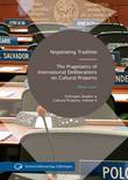Explore

Communicative interactions in international negotiations on cultural property not only provide information about the emergence and proliferation of arguments, rhetorics, and registers, but also permit valuable insights into actors’ positions, strategies and alliances. They significantly influence local and national practices and views related to cultural property debates. What can be gained from a deep analysis of the communicative patterns and strategies that actors engage in – the entailing text and talk of negotiations – is a better understanding of the process itself: how do different actors argue, what kind of strategies and rhetorics do they use, to which instruments and institutions do they refer, and in what way do actors react to each other? An analysis of communicative interactions contributes to the question of how international negotiations work. The analytic inclusion of sociolinguistic practices allows insights into positions, strategies, and perspectives pertaining to cultural property. By looking at not only what actors say, but also at how and in what contexts they do so, it is possible to make more accurate statements about their positions and perceptions in cultural property debates. As these communicative interactions influence outcomes considerably, an approach from linguistic anthropology is not only beneficial for an understanding of specific negotiations, but also for the analysis of broader cultural property issues.
This book is included in DOAB.
Why read this book? Have your say.
You must be logged in to comment.
Rights Information
Are you the author or publisher of this work? If so, you can claim it as yours by registering as an Unglue.it rights holder.Downloads
This work has been downloaded 446 times via unglue.it ebook links.
- 103 - pdf (CC BY-ND) at OAPEN Library.
- 193 - pdf (CC BY-ND) at OAPEN Library.
Keywords
- Communicative Interactions
- Cultural property
- Cultural Studies
- European Union
- indexicality
- Indigenous peoples
- Intellectual property
- Linguistic Anthropology
- Opening statement
- pragmatics
- Rhetorics
- Society & culture: general
- Society & Social Sciences
- Speech community
- thema EDItEUR::J Society and Social Sciences
- thema EDItEUR::J Society and Social Sciences::JB Society and culture: general
- thema EDItEUR::J Society and Social Sciences::JB Society and culture: general::JBC Cultural and media studies::JBCC Cultural studies
- Traditional knowledge
- World Intellectual Property Organization
Links
DOI: 10.4000/books.gup.608Editions

